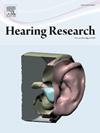胰岛素样生长因子1保护耳蜗外毛细胞抵抗顺铂
IF 2.5
2区 医学
Q1 AUDIOLOGY & SPEECH-LANGUAGE PATHOLOGY
引用次数: 0
摘要
顺铂是一种有效的抗肿瘤药物,广泛应用于肿瘤治疗方案中,但具有耳毒性等副作用,目前尚无治疗方法。顺铂给药后耳蜗的组织学病变以Corti器官的外毛细胞最为突出。我们之前报道过胰岛素样生长因子1 (IGF1)保护耳蜗毛细胞(hc)免受几种耳蜗损伤,包括噪音暴露、缺血、手术创伤和氨基糖苷,从而导致听力恢复。在本研究中,我们利用出生第2天的小鼠耳蜗外植体培养系统,研究了IGF1作为一种分子对内耳听觉细胞抗顺铂的保护作用。在含有顺铂的培养基中培养的外植体中加入IGF1可显著保护外hc免受顺铂诱导的损伤。使用IGF1R拮抗剂或抑制剂对IGF1受体(IGF1R)进行药理学抑制可显著减弱IGF1的保护活性,这表明IGF1R是IGF1对顺铂的特异性作用所必需的。作为抗顺铂的一种保护机制,我们发现IGF1可以降低顺铂诱导的氧化应激。IGF1对HC数量维持的作用是通过抑制HC的凋亡实现的,而不是通过诱导HC或支持细胞(SCs)的增殖实现的。我们的结论是,IGF1治疗可能是治疗顺铂诱导的耳毒性的有效和安全的方法。本文章由计算机程序翻译,如有差异,请以英文原文为准。
Insulin-like growth factor 1 protects cochlear outer hair cells against cisplatin
Cisplatin, an effective anti-neoplastic drug widely used in oncology protocols, has an adverse effect such as ototoxicity, for which no current treatment exists. Histological lesions in the cochlea after cisplatin administration are most prominent in outer hair cells in the organ of Corti. We have previously reported that insulin-like growth factor 1 (IGF1) protects cochlear hair cells (HCs) against several types of damage to the cochlea, including noise exposure, ischemia, surgical trauma, and aminoglycoside, resulting in hearing recovery. In the present study, we investigated the efficacy of IGF1 as a molecule to protect inner ear auditory sensory HCs against cisplatin using cochlear explant culture systems of postnatal day 2 mice. Administration of IGF1 to the explants grown in the medium containing cisplatin markedly protected outer HCs from cisplatin-induced damage. Pharmacological inhibition of IGF1 receptor (IGF1R) using an IGF1R antagonist or inhibitor markedly attenuated the protective activity of IGF1, indicating that IGF1R is specifically required for IGF1 effects in HCs against cisplatin. As a protective mechanism against cisplatin, we found that the administration of IGF1 reduces cisplatin-induced oxidative stress. IGF1 effects on the maintenance of HC numbers are achieved by inhibiting the apoptosis of HCs, not by inducing the proliferation of HCs or supporting cells (SCs). We conclude that treatment with IGF1 could be an efficient and safe approach to treat cisplatin-induced ototoxicity.
求助全文
通过发布文献求助,成功后即可免费获取论文全文。
去求助
来源期刊

Hearing Research
医学-耳鼻喉科学
CiteScore
5.30
自引率
14.30%
发文量
163
审稿时长
75 days
期刊介绍:
The aim of the journal is to provide a forum for papers concerned with basic peripheral and central auditory mechanisms. Emphasis is on experimental and clinical studies, but theoretical and methodological papers will also be considered. The journal publishes original research papers, review and mini- review articles, rapid communications, method/protocol and perspective articles.
Papers submitted should deal with auditory anatomy, physiology, psychophysics, imaging, modeling and behavioural studies in animals and humans, as well as hearing aids and cochlear implants. Papers dealing with the vestibular system are also considered for publication. Papers on comparative aspects of hearing and on effects of drugs and environmental contaminants on hearing function will also be considered. Clinical papers will be accepted when they contribute to the understanding of normal and pathological hearing functions.
 求助内容:
求助内容: 应助结果提醒方式:
应助结果提醒方式:


